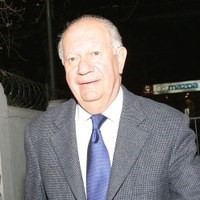Santiago (Chile), 1938
By Rodrigo Nobile
He entered the University of Chile (UC) at the age of sixteen, where he graduated in law, defending the thesis “The Concentration of Economic Power.” The work, which studies wealthy Chilean families, achieved great editorial success. Ricardo Froilán Lagos Escobar won a scholarship to pursue a PhD in Economics at Duke University in the United States, between 1960 and 1962. Upon returning to the country, he took up the position of professor at the UC’s Institute of Economics, where, later on, he became the Secretary-General.
In 1972, President Salvador Allende appointed him as ambassador to Moscow, but the unfriendly Congress and the military coup of September 11, 1973, prevented his appointment. Fleeing the repression, Lagos went into exile in Argentina, where he worked as Secretary-General of the Latin American Faculty of Social Sciences (Flacso) and the Latin American Council of Social Sciences (Clacso). Later, he moved to the United States, where he taught at the University of North Carolina and served as an economist for the United Nations.
He returned to Chile in 1978, where he worked for the United Nations Regional Employment Program (Prealc). During the 1980s, he was one of the leaders of the Socialist Party and presided over the Democratic Alliance created in 1983, which brought together most of the parties opposing the military regime. On September 7, 1986, he was arrested and interrogated about the assassination attempt on Augusto Pinochet that occurred on the same day. After nineteen days, he was released, with the help of an international campaign.
Later, Lagos became involved in the campaign for the “NO,” through which he traveled the country advocating for the end of the military regime; this cause was victorious in the 1988 plebiscite. Although he gained great notoriety with the campaign, he supported Patricio Aylwin Azócar, the candidate from the Concertación de Partidos por la Democracia. After the victory, he assumed the Ministry of Education, implementing a reform of educational decentralization. In the 1993 elections, he supported the candidate from the center-left alliance, Eduardo Frei Ruiz-Tagle, whose government appointed him to the Ministry of Public Works.
In 1999, Lagos began his presidential campaign. His main opponent, the right-wing Joaquín José Lavín Infante, from the Independent Democratic Union, launched a strong campaign, dissociating himself from Pinochet’s authoritarian figure and depoliticizing the debate, which secured the convergence of the right and a high vote for this current. The decision went to a second round, which Lagos won on January 16, 2000, with 51.31% of the votes. Sworn in on March 11, Lagos was the first president elected by the Concertación who was not linked to the Christian Democratic Party but to the center-left bloc: the Socialist Party, the Social Democratic Radical Party, and the Party for Democracy, of which he was also a member.
His mandate was strongly criticized by the left for continuing privatization policies, public service concessions, signing free trade agreements with the United States, the European Union, and other countries, and for the slow pace in judging the military who committed human rights violations. Nevertheless, in 2006, he elected his successor, Michelle Bachelet.



